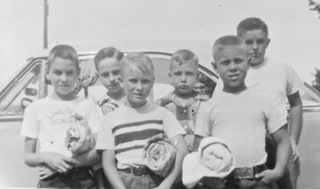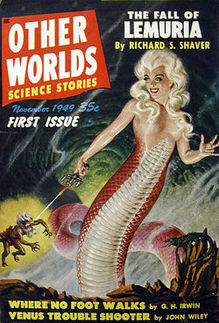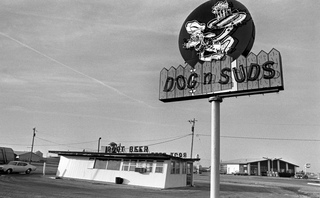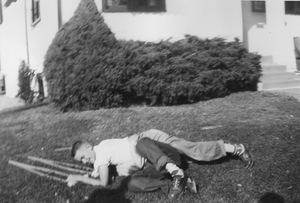 A new movie is titled “(500) Days of Summer.” That’s what it looked like on the last day of school, time reaching forward beyond all imagining. There was a heightened awareness in the room as the second hand crept toward our moment of freedom. We regarded the nuns as a discharged soldier does his superior officer. Here had existed a bond that would never be again. We didn’t run screaming out the door. We sauntered. We had time. We were aware of a milestone having passed.
A new movie is titled “(500) Days of Summer.” That’s what it looked like on the last day of school, time reaching forward beyond all imagining. There was a heightened awareness in the room as the second hand crept toward our moment of freedom. We regarded the nuns as a discharged soldier does his superior officer. Here had existed a bond that would never be again. We didn’t run screaming out the door. We sauntered. We had time. We were aware of a milestone having passed.
Some kids would go to second homes, or visit relatives, or summer camp. My friends and I would stay at home. We would have nothing planned. The lives of kids were not fast-tracked in those days. We would get together after breakfast and make desultory conversation, evaluate suggestions and maybe play softball, shoot baskets, go down somebody’s basement, play cards, go to the Urbana Free Library for Miss Fiske’s Summer Reading Club, rassle on the lawn, listen to the Cardinals, play with our dogs, or lay on our stomachs on the grass and read somebody’s dad’s copy of Confidential magazine. Somebody’s mom was probably keeping an eye on us through a screen window.
Our bicycles were our freedom. We would head out for Crystal Lake Park, dogs barking behind us until they grew disinterested in this foolishness and fell back. Or maybe this would be a day when we would earn money. This we did by mowing lawns, or when we were younger taking a card table out to the sidewalk and opening a lemonade and Kool-Aid stand. Some kid would announce he was “opening,” and we would look at him in envy, because he was in retail, and we wished we had thought of it first. It was nothing for two adults, perfect strangers, to pull over and invest a dime to drink from two jelly glasses, washed out in a soup pot full of dishwater. When the sun fell lower in the sky, the newspaper trucks would come around pitching bundles, and I would ask a pal, “Want to walk me on my paper route?” Always “walk me.” Never “walk with me.”

Neighborhood friends on our way to Crystal Lake. Left to right: Jerry Seiler, Steve Shaw, Holmesey, me, Larry Luhtala, Gary Wikoff.
In all of our movements around town, away from home base, we peed when we had to and where we could. Behind trees, in shrubbery, against back walls, in the alley. This we called “Airing the snake,” or, more politely, “Going to see a man about a dog.” Recently the City of Urbana dedicated a plaque on the sidewalk marking my childhood home, and from my seat on the platform I could see several of my boyhood pissoirs. Why didn’t we just go home? Your mom might grab you and make you do something.
I was an only child, and content with my own company, especially after I discovered science fiction. I occupied a corner of the basement where I positioned my cast metal book shelves, three books of Green Stamps each. On these I placed the old s-f magazines that the two foreign brothers, graduate students on my Courier route, had given me. Astounding, Galaxy, Fantasy and Science Fiction. Then I discovered, more to my taste, Amazing, Imagination and the last issues of the full-size pulp Thrilling Wonder Stories. These were sold by Smith Drugs on Main Street, where from an issue of Sunshine and Health I learned for the first time what it was that women had under their sweaters, and an electric current shot through me. Science fiction itself somehow had an aura of eroticism about it. It wasn’t sexually explicit, but it often seemed about to be.
Down in the basement it was cooler. I reclined in an aluminum lawn chair, and played albums on my record player–Pat Boone, Doris Day, the McGuire Sisters, Benny Goodman, Les Paul and Mary Ford, Polly Bergen, who sent me an 8×10 autographed photo. I wrote to Percy Faith and he mailed me a dozen of his 45s. I wrote asking Stan Freberg for an autographed photo, and he wrote back regretting that he was all out of photos, but as a consolation was enclosing a hairpin from Betty Furness. All recorded music evoked thoughts of girls.

The promise of Eros. From my collection
Sometimes a Central Illinois thunderstorm would come ripping out of the sky, louder and more violent than anything I’ve ever seen in Chicago. Afterwards the rainwater would be backed up at the corner drains, and we would ride our bikes through it, holding our Keds high to keep them dry. The rest of the time it was hot outside, sometimes for a few days even “above 100 degrees Fahrenheit,” we said in an official tone. Air conditioning was rare. Windows and screen doors stood open day and night. The idea was to get a “cross breeze,” although actually you just left everything open and the breeze did whatever it wanted.
My parents had a Philco window air conditioner in their bedroom. After they finished their iced tea and their last cigarettes on the front porch, my father would say, “Time to turn on the air conditioner.” In my room I read late into the night in the heat and humidity, the book balanced on my chest, my chin making a puddle of sweat on my neck. I was decked out in what my Aunt Martha described approvingly as “shorty pajamas.”
In the summer mornings, I remember the freshness of the new air, and my father in the kitchen listening to Paul Gibson on the radio from Chicago. For years Paul Gibson talked for 13 hours a week on WBBM, calling himself a “word jockey,” and today who remembers him? Television came late to Champaign-Urbana, because The News-Gazette and the Courier were fighting for the license. But we had radio. The 50,000 clear channel stations boomed in from Chicago: WBBM (CBS), WGN (Wally Phillips with “Your Top Ten on WGN” and the Cubs), WMAQ (NBC), WLS (ABC and Dick Biondi). And from St. Louis: (KMOX (Harry Carey doing the Cardinals, until, all kids believed, “Augie Busch caught him with his wife and threw him out of town”).
 The Dog n Suds on Philo Road in Urbana, summer of 1975. Photo by GaleChicago.
The Dog n Suds on Philo Road in Urbana, summer of 1975. Photo by GaleChicago.
The local stations were WDWS and WKID. On one of them one morning from the kitchen (the air filled with the aromas of toast and coffee), I heard “The Wayward Wind” by Gogi Grant, and that song has haunted me all of my life. WDWS had CBS and Larry Stewart, the Voice of the Fighting Illini. WKID had Joe Ryder, the “Country Gentleman,” in the morning, and a mix of pop and country all day. It was sunup to sundown. In the evening sometimes I would ride my bike out to the Philo Hard Road and visit the Dog ‘n Suds, where the Dog in a Basket, including cole slaw, fries and a root beer seemed to me a spectacular feast.
WKID was right next door. The disc jockey until sign-off was Don McMullen, who also read the news off the United Press wire and did the commercials. One night after gorging myself on a Dog in a Basket, I walked over to the radio station and peered through the screened door. Don McMullen was walking past and asked if he could help me. “I just want to look,” I said. He let me in, pulled up a chair, and let me watch him at the microphone. He’d read a commercial (quite possibly for Huey’s store), while using his thumb to hold a cued-up record on a turntable that was already spinning. Then he’d announce the record and lift his thumb. This was unspeakably cool.
While the song was playing he took me into a closet where the wire ticker was pounding, ripped off yards of news and threw it away, ripped off the weather forecast, and went back to the broadcast booth. “Something Smith and the Redheads,” he said, and then: “We have a young announcer here named Roger who is going to tell us about the weather.” He pointed to the paper in front of me and swiveled the mike over. I was almost dizzy with a flush of excitement. “Sunny and warmer tomorrow, with a high around 80,” I read. “Good job, Roger,” Don said. I had been on the radio. There was no turning back. When Don got married I gave him steak knives.

Karen Weaver and Jackie Yates. Jackie, if you see this, send me your photo,
My best friends were Hal Holmes, Jerry Seiler, Larry Luhtala, George Reiss and Danny Yohe from across Washington Street, and on my side the Steve, John and Chuck Shaw, Johnny Dye, Karen Weaver and Steve and Joe Sanderson, with Gary Wikoff and Jackie Yates on Maple Street. We boys would form circles with our bikes, one foot braced on the ground, as a girl would sit on her porch steps and hold court. I sensed these conversations were about more than they seemed. Hal and Gary were a little older, and seemed to understand more.
The Four Stampers Stamp Club would meet in my basement to trade stamps, allegedly, and look up years and prices in our “Elmers,” the thick orange booklets from Elmer R. Long and Co. in Boston. I say “allegedly” because the talk quickly turned to girls–those at school, and, with wonder, Jayne Mansfield. One night a Four Stamper explained to me what men and women “did” together, demonstrating with the fingers of one hand forming a circle and a finger from the other hand poking into it. “You know, like this,” he said. All finally became clear to me, although I couldn’t figure out what the circle stood for. The navel, probably? Worked for me.
A lot of time was spent trying to get cool. Riding our bikes worked, but when we stopped we’d be streaming with sweat. All of us would ride over to Harry Rusk’s grocery, park our bikes against his wooden porch and reach into his cooler, a block of ice floating in the water, and haul out a Grapette, a Choc-Ola, or maybe an RC, because for the same money you got more. Never a Coke or 7-Up, which you got at home, and you didn’t see the point of 7-Up anyway, although “You Like It–It Likes You!”

Something like ours looked, but that’s not my old man’s ’50 Plymouth. Painting by Kay Crain.
If we rode our bikes out to Crystal Lake, we would pass the A & W Root Beer Stand at Race and University. A five-cent beer in a frosted mug. Then we would go to the swimming pool and wash off our bike sweat in the water. In high school I was hired by the pool manager Oscar Adams to be an assistant lifeguard. My duties including the Poop Patrol, my tools a face mask, a waste basket, and a spatula. General cheering each time I emerged triumphant from the deeps. Oscar Adams was also the high school basketball coach, driving instructor, Physical Education teacher, and chaperone at the Tigers’ Den on Friday nights. Urbana couldn’t do without him. He had one daughter in particular, Barb, who brought to life the wonderful qualities of a bathing suit.
Movie theaters advertised, It’s Cool Inside! To make this difference more dramatic, the Princess on Main Street made the temperature as cold as possible. Returning to the blinding sunlight, we got immediate headaches between our eyes. Hal and I called each other Holmesey and Stymie. Sometimes Holmesy and I would head across the street to the fountain at McBride’s Rexall Drugs where he introduced me to the Cherry 7-Up and my prejudice against 7-Up disappeared. We sipped them so slowly they could have been liquid gold. We agreed it was the best-tasting drink in the world. There I also searched the paperback racks for Robert Sheckley, Arthur C. Clark and Theodore Sturgeon. Also the Ace Doubles, two s-f novels in the same binding, the cover of one novel on one side, and turn it over and upside-down, the other cover. I read my first Philip K. Dick in an Ace Double. To sell Philip K. Dick in those days, Ace had to bundle him with someone else. Today he has two volumes in the Library of America.
Sunday Mass at St. Patrick’s was sweltering. The doors stood open, the lower panes of the stained glass windows were propped wide, and big osculating fans swept the congregation, although these were turned off during Fr. Martel’s sermon, and we worked the fans that were Compliments of Renner-Wikoff Funeral Home.
 Rassling on my front yard. Jerry Seilor has me pinned. Those are his crutches.
Rassling on my front yard. Jerry Seilor has me pinned. Those are his crutches.
The midday meal was the big one on Sundays, and after a nap, for his dinner my father liked oatmeal. Then we watched Ed Sullivan. Then my father would say, “My oatmeal has worn off. Does anyone feel like a chocolate malted?” In my high school years there was the Dairy Queen, but in grade school we went to Hudson Dairy on Race Street, a counter lined with stools, a strong aroma of milk, a malt that came with a metal can to hold the part that didn’t fit in the glass. “They give you a smaller glass so it feels like you’re getting more,” my father explained several dozen times.
What did I read late at night? Amazing Stories, Fantastic Stories, and Earl Stanley Gardner. Of the countless other books I read, I remember two: Julius Caesar by Shakespeare, and By Love Possessed, by James Gould Cozzens. By Love Possessed made a deep impression on me, although today I have forgotten everything about the novel except its deep impression. Later came Thomas Wolfe, sweeping all before him.
The nature of summer changed as I grew older. I got a part-time job at Johnston’s Sports Shop in 1956, and my first newspaper job at The News-Gazette in 1958. Holmesy got an early 1950s Chevy. We’d go out to the new McDonald’s at Five Points, across the street from Huey’s Store (“What’s not on the shelf is on the floor. If it ain’t on the floor we ain’t got it no more”). A couple of years later I got my first car, $395, a 1954 Ford, sky blue. I painted the wheel rims red, bought sick-on white sidewalls, and hung a pair of foam dice from the rear-view mirror. Left sitting in the sun, it smelled inside like scorched plastic, and the steering wheel was too hot to touch. Summer no longer lasted until time immemorial. The last day of summer came sooner. Time compacted. Life closed in.
The Lovin’ Spoonful performs “Summer in the City”
Martha and the Vendellas perform “Heat Wave”
Eddie Cochran does “Summertime Blues”
Janis Joplin performs “Summertime”
Gogi Grant sings live: “The Wayward Wind:
A 1958 Time magazine profile of Paul Gibson.
An “Elmer” was discovered by a reader, DR Deaver, for sale at $19.95 on eBay..
Hal Holmes discovered three of his treasured old Elmers, and if he lists them on eBay he could take Cathy out to dinner:

¶











